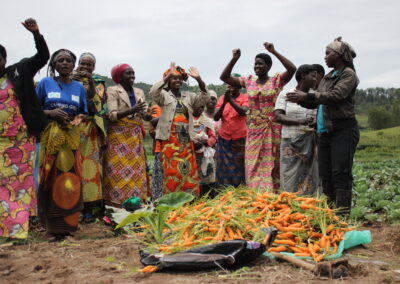Violence against women
How unpaid care work is connected to violence against women and girlsViolence against women and girls is all too common. It brings suffering to women all over the world, as well as holding women and girls back from fulfilling their social and economic potential.
Whether physical, emotional, verbal, sexual, financial or legal violence, it’s abuse that’s targeted at women or girls because of their gender. Unpaid care work is a form of violence against women and girls. Like other forms of violence, it’s perpetuated by social norms and specific practices.
In this module we look at how interventions can work to tackle the issues surrounding unpaid care work and violence against women.
Learning aims
Completing this module will give you an understanding of:
- How unpaid care work is a form of violence against women and girls
- How interventions to recognise, reduce and redistribute unpaid care work can also reduce violence against women and girls.

Tamanna skips with a friend in her backyard, Bangladesh. Photo: Md. Deloar Hossain/ActionAid
Violence against women and unpaid care work
Violence against women and girls takes various forms. For example:
Bride price and dowry
Practices like bride price or dowry encourage men to view women as their property, or to believe that they have ‘pre-paid’ for her unpaid care work throughout her life.
Lack of access to paid work
When women are discriminated against, or blocked from paid work by subtle or explicit forms of violence, unpaid care work can seem like the only role for a woman.
Social norms
The belief that women should not leave the home, be seen in public, or go to spaces that are dominated by men, all trap women in unpaid care work. That’s why access to markets can be so powerful: it can explode restrictions on women’s behaviours, and their ability to earn, manage or control money.
Assata’s story
Assata Yakubu is a member of the Enye Nyame Den women’s group in Manyhia community, Ghana. She is one of the elders in her community. Assata Yakubu has often witnessed and counselled couples before their marriages. In the past, however, this counselling was not enough to end violence against women.
But something’s changed.
There’s been a drastic reduction in violence against women in their community.
What’s caused it?
“In this community, we no longer hear fighting among couples” says Assata. “The beatings and crying have reduced drastically. The men no longer beat their wives. Men are also now free from injuries because some women were using objects to attack them, too. In the past, women could get miscarriages because of violence. Old ladies like me were suffering because even food to eat was a problem, the entire work of cooking was left to women and our daughters-in-law. This was very tiring and started quarrels.
“Through the unpaid care work sensitisations, men and boys are now very helpful in household chores.”
“Families in this community are now living very affectionately. Just yesterday, my son prepared food for us to eat, he did not leave the cooking for his wife. I can see their marriage is joyful and my daughter-in-law is happier than before.”
Since POWER introduced sensitisation training, Assata reports that confidence and solidarity have grown among the women in her community.
“In the past, I could not even communicate well with my fellow women to even talk of men. Most women like me were very shy and could not make our views known or speak up against the violence perpetrated against us.
“Now, we are all very engaged in decisions at home and we communicate well with our husbands. The men have recognised us. So no more violence.”
Assata Yakubu and her group have been taken through a series of trainings in communication, rights awareness, violence mapping and reporting mechanisms. By tackling a wide range of vulnerabilities that women have in this community, the POWER project has equipped these women to be assertive and being able to claim their rights.
Dig deeper
In this webinar we discuss the connections between unpaid care work and violence against women and girls.
Learning action
Add your responses below and submit them to test your knowledge and understanding.



Recent Comments